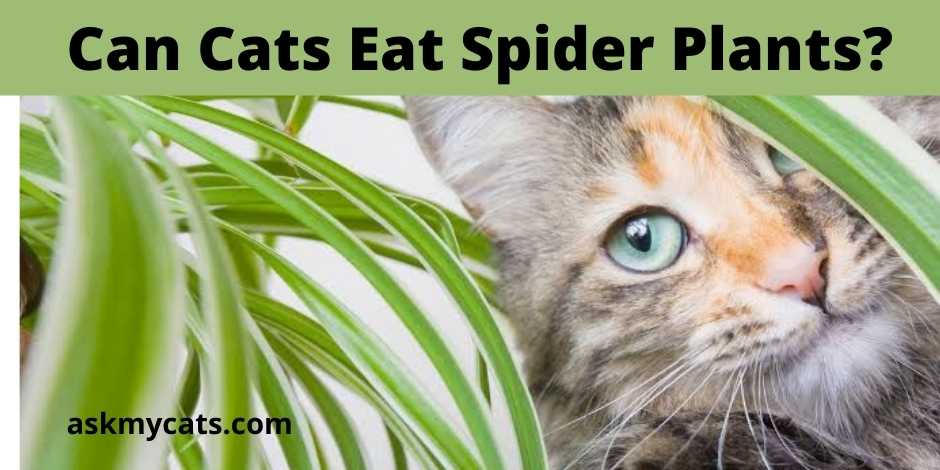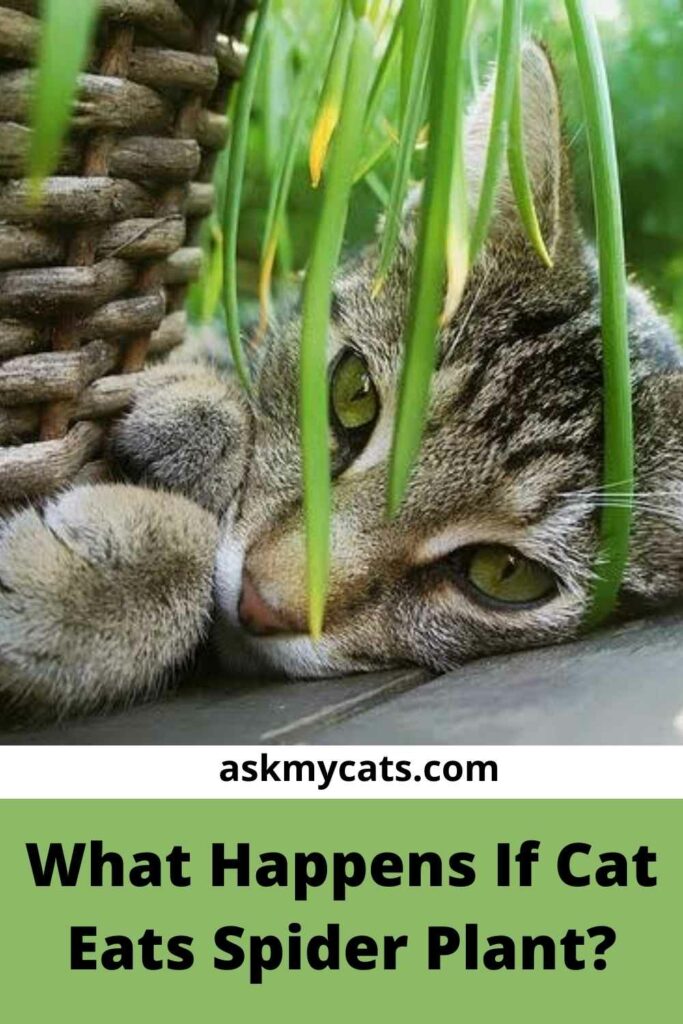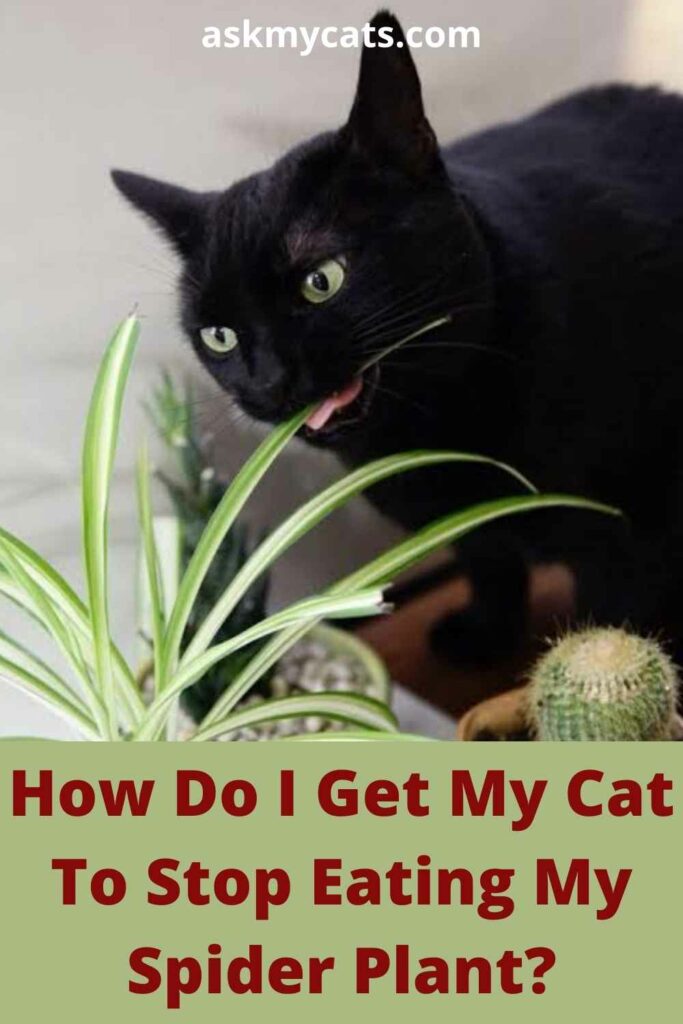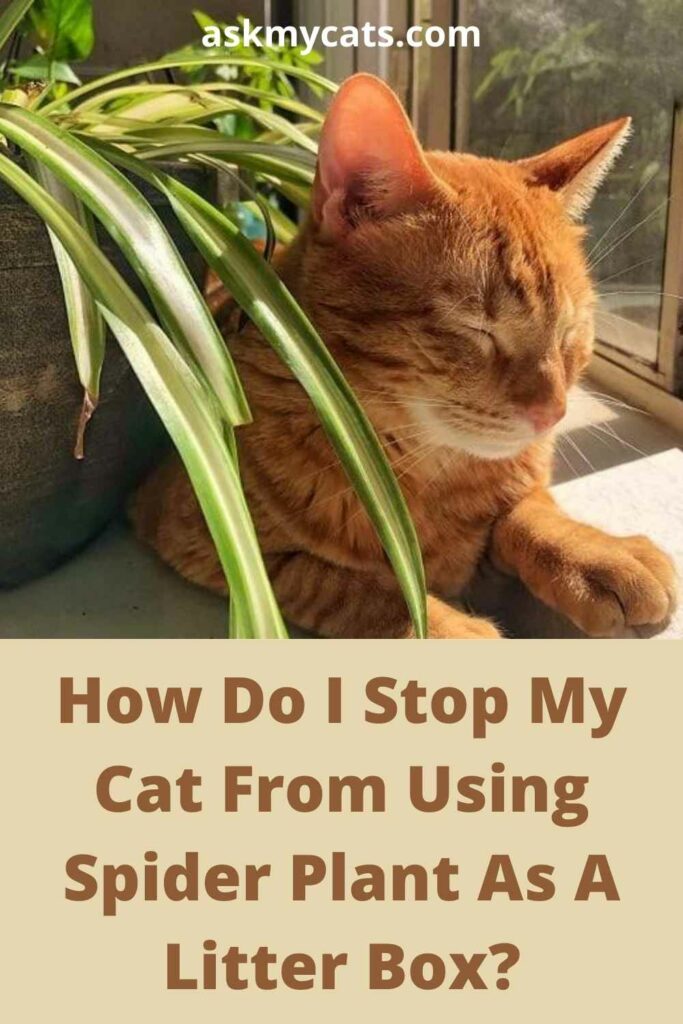The spider plant (Chlorophytum comosum) is a popular houseplant. When it comes to the relationship between cats and spider plants, there’s no disputing that cats are strangely drawn to this houseplant. So you’re probably wondering why your cats are eating spider plant leaves.
If you have a cat and enjoy houseplants, you know that some of our feline companions may get fascinated with indoor flora. They like nibbling on leaves, resting in the mud, and even using plants as litter boxes on occasion.
Yes, cats can eat spider plants. The American Society for the Prevention of Cruelty to Animals (ASPCA) considers it non-toxic. However, the plant has psychedelic elements that may cause your feline to experience hallucinations.
If you want to learn more about your furry friend and their love for spider plants, keep reading!


Give Your Cat the Perfect Day
Get the Free Ebook!
Why Do Cats Love Spider Plants?
Cats may be drawn to spider plants because the long leaves mimic grass, which cats consume to help calm their tummies.
Others believe it has something to do with spider plants generating opium-like chemicals that give cats a high comparable to catnip. Whatever it is that attracts cats to spider plants, they can’t get enough of them.
While the plant emits a faint fragrance that is hardly detectable by humans, this is not what attracts the animals. Perhaps it’s because cats are inherently drawn to all things dangly, and your cat is just drawn to the plant’s hanging spiderettes, or perhaps cats are drawn to spider plants out of boredom.
Both are plausible theories, and both are somewhat correct, but they are not the only causes for this strange affinity.
Spider plants release compounds that encourage your cat’s compulsive behaviour and curiosity, similar to the effects of catnip.
Are Spider Plants Poisonous To Cats?
You’ve probably heard of spider plants’ alleged psychedelic effects. According to some reports, it has been discovered that this plant does allow felines to have a minor psychedelic effect. These effects, however, are believed to be safe.
On the ASPCA (American Society for the Prevention of Cruelty to Animals) website, as well as many other educational sites, the spider plant is classified as non-toxic to cats and other pets. Nonetheless, it is still recommended that cats not consume spider plant leaves since they may represent a risk.
Chemical substances found in spider plants are thought to be linked to opium. Even though these chemicals are not poisonous, they can cause stomach discomfort, vomiting, and diarrhoea. As a result, despite the minor effects of spider plant toxicity, it is suggested that you keep cats away from the plants.
All cats, like people, are unique, and what affects one cat moderately may have a very different effect on another. Even though spider plants are harmless for cats, as previously said, they may cause your kitty to trip.
What Happens If Cat Eats Spider Plant?

Spider Plants are non-toxic to both dogs and cats, according to the ASPCA. The Spider Plant, on the other hand, attracts cats in part due to its moderate psychedelic properties.
Because cats are more inclined to play with the plant, they are more likely to consume it and have stomach distress, vomiting, or diarrhea as a result. We advise you to avoid keeping spider plants.
No, they won’t harm your feline, but spider plants are similar to catnip in that they release compounds that cause cats to become enamoured with them. Catnip isn’t harmful to cats, but the spider plant could be.
Spider plant has some psychedelic qualities. However, keep in mind that they are quite mild and will just cause some crazy or jumpy behaviour in your cat. Even though these plants are not harmful, if your cat eats too much of them, it may end up in danger.
This is why, if at all possible, you should keep your cat away from these plants. Your cat may have stomach pains, vomiting, and diarrhea as a result of the opium-related chemicals.
If you peek in the litter box and observe watery or loose faeces, you’ll notice this. It’s also possible that your cat is bent over and in pain.
Before you head to the vet, check to see whether the spider plant has been nibbled on. It will assist your veterinarian in diagnosing your kitty’s issues more quickly.
Why Do Cats Attack Spider Plants?
The spider plant hangs in all directions, making it the ideal source of fun for a bored house pet. Cats, on the other hand, like them because they create hallucinations.
They’ve even earned the nickname “cat’s whiskers.” Their leaves are grassy green, yellow-striped, or even white in colour. Cats, like humans, are enamoured by them.
Will Spider Plants Kill Cats?
Although spider plants are supposed to be non-toxic to cats, they can cause your feline to become unwell. If your cat consumes enough spider plant leaves, he or she may experience nausea, vomiting, and diarrhea.
While spider plants can not harm cats, they can make them quite sick. Spider plant leaves contain natural opium-like chemicals that cause moderate, but safe, hallucinations in cats.
How Do I Get My Cat To Stop Eating My Spider Plant?
Even though spider plants aren’t harmful to cats, no one wants their treasured houseplants to be eaten. Here are some things to try if you want to get rid of your cat from eating away your spider plants:

1. Keep Them In Hanging Baskets
If your cat likes to devour plants, there are several things you can do to keep them away from spider plants. Because spider plants are commonly found in hanging baskets, just put them up high and out of your cats’ reach. This includes keeping them away from windowsills and furniture, which cats like to climb.
2. Spray With Repellant
If you don’t have a good spot out of reach to hang your plant, consider spraying the leaves with a bitter-tasting repellant. While not perfect, it may help because cats avoid plants that have a poor flavor.
3. Keep Them In A Separate Room
It’s usually a good idea to keep your spider plants in a different area where your kitty buddy can’t access them. Many people, for example, keep houseplants in their bathrooms to benefit from the humidity.
4. Grow Plants For Your Cat
Consider cultivating plants just for your cat. While many houseplants are toxic to cats, there are others that are specifically designed for them.
There are several varieties of cat grass and catnip plants available on the market for your cat to munch on at its leisure, and they are also extremely easy to cultivate from seed at home. Having these attractive plants around can deter your cat from destroying your prized spider plants.
5. Keep Your Cat Entertained
Make sure your cat gets plenty of stimulation. Boredom is one of the reasons your cat may abuse your beloved houseplant. To work off your cat’s energy, make playing with it a part of your everyday routine. A tired cat is less inclined to go out of its way for entertainment, which means fewer plants are knocked over and fewer tears for you.
6. Prune The Plants
If your spider plants’ foliage has grown to the point that the spiderettes are within reach of the cat, you may need to trim them back or divide them.
Finally, if your cats feel the urge to graze on some greens, consider growing some indoor grass for their own amusement.
How Do I Stop My Cat From Using Spider Plant As A Litter Box?

Although most people are more upset when their houseplants are eaten by cats, some cats make life even more difficult by utilising indoor plants as litter boxes. Here, we will discuss some things to attempt to put your houseplants off bounds so your cat may stop using it as a litter box.
Make sure the litter box is free of debris. Cats are tidy creatures that will seek out another litter box if the current one is too filthy. This implies you should clean your litter box once a day at the very least. If you have many cats, each one should have its own litter box.
It’s also a good idea to stagger the litter boxes throughout the home in case one cat becomes territorial.
You may also consider switching out the litter box. When the litter hurts their paws, cats will go somewhere else to relieve themselves, such as in your houseplants. Pellets, for example, might be difficult to stand on, and dusty brands can irritate their eyes or lungs.
If your cat is declawed, it may be even more sensitive to the type of litter you use and seek relief elsewhere.
Consider covering the top layer of soil with stones or netting to make it more difficult to dig around in. Even if the mesh isn’t perfect, you can at least select stones that fit your style!
Frequently Asked Questions
Will A Spider Plant Hurt A Cat?
According to the APSCA, spider plants are not harmful to cats. Even though it is deemed non-toxic, it can cause stomach discomfort, vomiting, and diarrhoea.
What Can You Spray On Plants To Keep Cats From Eating Them?
If you sprinkle cayenne pepper among the leaves of your houseplants, your cat will immediately flee. Citrus is also repulsive to cats. To help discourage them, put orange and lemon peels in your pots alongside the plants.
What Houseplants Are Safe For Cats To Eat?
Birds Nest Fern, Elegant Orchid, Money Tree, Cat Grass are safe for cats to eat.
Final Words
It’s tough to keep a houseplant away from a chewing pet, therefore we have to be sure that any plants we cultivate in the house are safe and non-toxic to cats and dogs.
Despite the fact that spider plants are harmless to cats, letting your feline companions consume too much of this green pleasure is not suggested – either for your kitty’s stomach or for the health of your houseplant.
So, instead of putting your plant out of reach, give your cat some cat grass.
Drop down your doubts regarding your feline friend in the comment section below and we will answer them soon!
